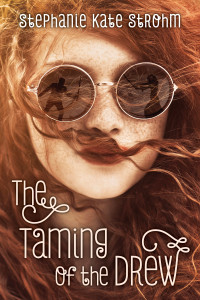“Taking the Fear out of Shakespeare”
When I started writing The Taming of the Drew, I had a very specific audience in mind. If I’m being perfectly honest with myself, I was writing it for me at sixteen.
The Taming of the Drew is a reverse-gendered retelling of The Taming of the Shrew set at an outdoor summer Shakespeare theatre in Vermont, where the backstage hijinks begin to mirror the plot playing out onstage. All of the characters have recently graduated from high school and are one hundred percent bonkers obsessed with theatre, just like I was. I was a passionate reader as a teen, but I never read any books about teens who were really into acting, and believe me, I would have loved one. So I set out to write The Taming of the Drew for past me, and, hopefully, any high school drama dorks who are currently caking on the foundation before the curtain goes up on their production of Much Ado About Nothing.
I’m not just a writer; I also work at a high school on the west side of Chicago. When my students asked me what my book was about, I found out that none of them had heard of The Taming of the Shrew – most of them, in fact, only had a vague idea of who Shakespeare was, and the ones who did know Shakespeare were most decidedly not fans of his. But the more I talked about my book, the more I realized I’d actually been writing for a different audience.
I was a Shakespeare nut from an early age – a freakishly early age – but I was first exposed to Shakespeare not from reading his plays, but from Charles and Mary Lamb’s Tales from Shakespeare. I loved the stories I read about exiled sorcerers and tragic kings. They were like fairy tales, and I devoured them. Thanks to those books, I loved Shakespeare before I’d heard a single line of his or watched any of his plays. By the time 10 Things I Hate About You came out in 1999, I was twelve and already a pretty advanced Shakespeare snob, but I loved that movie. Still do. I remember feeling a sense of supreme vindication when it came out. “See?!” I practically shouted at my friends. “Shakespeare is cool! I told you so!”
If students are first introduced to Shakespeare as seniors in a high school English class, it can be kind of a shock. The language is weird. It seems like too much effort to try and understand what anyone is saying. Frankly, the whole thing is intimidating. Shakespeare is so scary there’s even a whole series of books called No Fear Shakespeare! But I was never afraid of Shakespeare because I didn’t know I was supposed to be.
Several summers ago I taught the five to eight year old age group at the summer camp at MaineStage Shakespeare, an outdoor summer Shakespeare theatre in Kennebunk, Maine. Many people are surprised that five year olds attended a Shakespeare camp, but they made magnificent fairies in A Midsummer Night’s Dream. We wrote silly plays and learned fairy dances, but they also declaimed lines from Richard III in their vocal classes and offered lots of opinions on the nuances of Titania and Oberon’s relationship. They didn’t know Shakespeare was supposed to be hard. They knew he wrote funny stories about guys with donkey heads.
I wish we could some how introduce all five year olds to Shakespeare before they know he’s “supposed” to be scary. I realize, of course, that’s insanely unrealistic – but rest assured, if I ever become the benevolent dictator of this country, that will certainly be part of the program – but I also know there are ways to show that Shakespeare isn’t scary. That’s why I’m such a huge fan of retellings. Retellings are a great way to introduce reluctant readers who might otherwise balk at Shakespeare to the world of his plays. I know there isn’t a guarantee that everyone who reads Saving Juliet by Suzanne Selfors or The Fool’s Girl by Celia Rees or Ophelia by Lisa M. Klein will immediately search out the original source material, but I think it’s definitely a step in the right direction. The more the stigma of “scary” gets taken out of the conversation, the better students will fare when they’re inevitably staring down a Macbeth monologue in English class.
I had thought I was writing The Taming of the Drew for students like I had been, who have the entirety of Juliet memorized “just in case.” And if those students find the book, I really hope they like it. But I realized later on that this book is just as much, if not more so, for readers who have only the vaguest idea of who Shakespeare is, or who actively dislike him and his frequent usage of the word “forsooth.” I hope this book becomes somebody’s 10 Things I Hate About You: a pop culture gateway drug into classical theater.
“This sounds funny, Ms. Strohm,” one of my students said after I explained the plot of The Taming of the Shrew. “I can’t believe he ripped up her clothes like that. He’s crazy.”
“You think that’s crazy?” I asked. “Let me tell you about a guy named Titus Andronicus.”
And so I did.
The Taming of the Drew
About the Book: Cass McKay has been called stubborn, temperamental, difficult, and that word that rhymes with “witch” more times than she cares to count. But that’s all about to pay off. She has finally landed the role she was born to play—Kate, in The Taming of the Shrew—in the summer apprentice program of a renowned Shakespeare theater company in the forests of Vermont.
But Cass can barely lace up her corset before her troubles begin. Her leading man, Drew, is a complete troll, and he’s going to ruin Cass’s summer. Even worse, Cass’s bunkmate Amy has somehow fallen head over heels for Drew. Cass can’t let Amy throw herself at a total jerk, so she comes up with a genius plan to give Drew the personality makeover he so desperately needs: they’ll tame Drew just as Petruchio tames Kate! But as Shakespeare’s classic plays out offstage, Cass finds it harder and harder to resist falling for Drew herself.
The best kind of entertainment, The Taming of the Drew is smart, funny, fresh, and original. You’re going to love this badass heroine and her friends. You might even end up liking Drew, too.
Author Stephanie Strohm photographed for her “Pilgrams don’t wear Pink” book. Copyright Melissa Lynn 2011
About the Author: Stephanie Kate Strohm is the author of Pilgrims Don’t Wear Pink and Confederates Don’t Wear Couture. She graduated with a dual degree in theater and history and has acted her way around the United States, performing in more than twenty-five states. She currently lives in Chicago with her fiancé and a dog named Lorelei Lee.
Thank you to Stephanie for this honest post.
Thank you to Cheryl at Skyhorse Publishing for connecting us with Stephanie!



